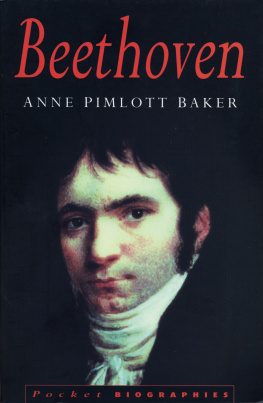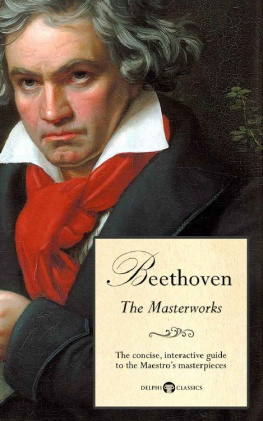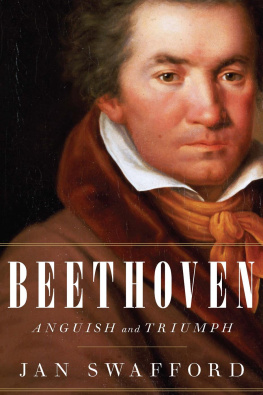Simply Beethoven
Leon Plantinga
Simply Charly
New York
Copyright 2020 by Leon Plantinga
Cover Illustration by Jos Ramos
Cover Design by Scarlett Rugers
All rights reserved. No part of this publication may be reproduced, distributed, or transmitted in any form or by any means, including photocopying, recording, or other electronic or mechanical methods, without the prior written permission of the publisher, except in the case of brief quotations embodied in critical reviews and certain other noncommercial uses permitted by copyright law. For permission requests, write to the publisher at the address below.
ISBN: 978-1-943657-65-0
Brought to you by http://simplycharly.com
Contents
Praise for Simply Beethoven
Simply Beethoven is a brief and eminently readable introduction to the life and works of the revered composer. Plantinga offers the layman reliable information based on his many years as a renowned scholar of the musical world of late-eighteenth and nineteenth-century Europe. This book taps into his long and vast experience as a musicologist and educator, bringing to life the spirit of Beethoven and the turbulent times that stood as the backdrop of his extraordinary creative life. A must-read for lovers of Beethoven seeking a short and reliable introduction to historys most powerfully influential composer.
David Benjamin Levy, author of Beethoven: The Ninth Symphony and Professor of Music, Wake Forest University
A succinct, insightful synthesis, presented in colorful but precise prose, by the dean of Beethoven studies. The many, little-known primary source descriptions of Beethoven are themselves worth the price of this book. If you want to learn about the life and art of Beethoven, Plantingas offering is by far the most efficient and pleasurable book available.
Craig Wright, author of The Hidden Habits of Genius and Professor of Music, Yale University
Leon Plantinga presents the ever-inspiring story of Beethovens life, music, and legacy with imagination and verve, including a wealth of colorfully telling details that keep the pages turning.
Scott Burnham, Graduate Center, City University of New York
This is an elegant, delightful, concise and richly informative introduction to Beethoven, the man and his music, written by a distinguished scholar whose breadth of learning and measured judgment are present on every page.
Leon Botstein, music director and principal conductor of the American Symphony Orchestra and president of Bard College
Leon Plantinga has written an engaging narrative that firmly places Beethovens life in the context of his surroundings, and makes detailed comments about many of the composers works. The book includes numerous interesting quotations from sources of the period.
Barry Cooper, author of Beethoven (Master Musicians Series) and Professor of Music, The University of Manchester
Other Great Lives
Simply Austen by Joan Klingel Ray
Simply Beckett by Katherine Weiss
Simply Beethoven by Leon Plantinga
Simply Chaplin by David Sterritt
Simply Chekhov by Carol Apollonio
Simply Chomsky by Raphael Salkie
Simply Chopin by William Smialek
Simply Darwin by Michael Ruse
Simply Descartes by Kurt Smith
Simply Dickens by Paul Schlicke
Simply Edison by Paul Israel
Simply Einstein by Jimena Canales
Simply Eliot by Joseph Maddrey
Simply Euler by Robert E. Bradley
Simply Faulkner by Philip Weinstein
Simply Fitzgerald by Kim Moreland
Simply Freud by Stephen Frosh
Simply Gdel by Richard Tieszen
Simply Hegel by Robert Wicks
Simply Hitchcock by David Sterritt
Simply Joyce by Margot Norris
Simply Machiavelli by Robert Fredona
Simply Napoleon by J. David Markham & Matthew Zarzeczny
Simply Proust by Jack L. Jordan
Simply Riemann by Jeremy Gray
Simply Tolstoy by Donna Tussing Orwin
Simply Stravinsky by Pieter van den Toorn
Simply Turing by Michael Olinick
Simply Wagner by Thomas S. Grey
Simply Wittgenstein by James C. Klagge
Series Editor's Foreword
S imply Charlys Great Lives series offers brief but authoritative introductions to the worlds most influential peoplescientists, artists, writers, economists, and other historical figures whose contributions have had a meaningful and enduring impact on our society.
Each book provides an illuminating look at the works, ideas, personal lives, and the legacies these individuals left behind, also shedding light on the thought processes, specific events, and experiences that led these remarkable people to their groundbreaking discoveries or other achievements. Additionally, every volume explores various challenges they had to face and overcome to make history in their respective fields, as well as the little-known character traits, quirks, strengths, and frailties, myths and controversies that sometimes surrounded these personalities.
Our authors are prominent scholars and other top experts who have dedicated their careers to exploring each facet of their subjects work and personal lives.
Unlike many other works that are merely descriptions of the major milestones in a persons life, the Great Lives series goes above and beyond the standard format and content. It brings substance, depth, and clarity to the sometimes-complex lives and works of historys most powerful and influential people.
We hope that by exploring this series, readers will not only gain new knowledge and understanding of what drove these geniuses, but also find inspiration for their own lives. Isnt this what a great book is supposed to do?
Charles Carlini, Simply Charly
New York City
Preface
I n this book, I aim to present the famed German composer Ludwig van Beethoven (1770-1827) in the context of his own time and place. Beethovens Europe was in perpetual tumult; as a young man, he witnessed the French Revolution and the Napoleonic conquests that followed. In fact, Napoleon twice invaded and occupied Vienna, where Beethoven lived at the time, with distinct consequences for the composers career. Then came the effort to restore order after Napoleons defeat at Waterloo in 1815, with the resultant stifling regime under the Austrian Chancellor Klemens von Metternich. Despite all such turmoil, Beethoven pursued his career in Vienna to the end.
He also struggled with personal demons: progressive hearing loss, perpetual illness, repeated disappointment in love. But in the face of all these impediments, he produced a body of music that brought him unprecedented fame in his own time and a central place in all succeeding repertories of classical music.
I hope to give a straightforward account of this composers colorful life, and to show something of the nature of his achievement by discussing some of his major compositions, their construction and effect, without resorting to technical language. I have listed at the head of each chapter the compositions that I describe in some detail.
Various friends have contributed to this endeavor; it is a pleasure to acknowledge their help. Prominent among them are people working in the Yale Music Library who have indulged me well beyond the line of duty; they include Karl Schrom, Kathy Mansi, Richard Boursy, Suzanne Eggleston Lovejoy, and the librarys director, Ruthann McTyre. Other colleagues who have lent me an ear and offered advice are Craig Wright and Hannah Lash. I thank my editor in this project, Helena Bachmann, for her careful attention to the text. But I owe the greatest debt to my wife, Ellen Ryerson, for whose constant support (and red pencil) I will always be grateful.












